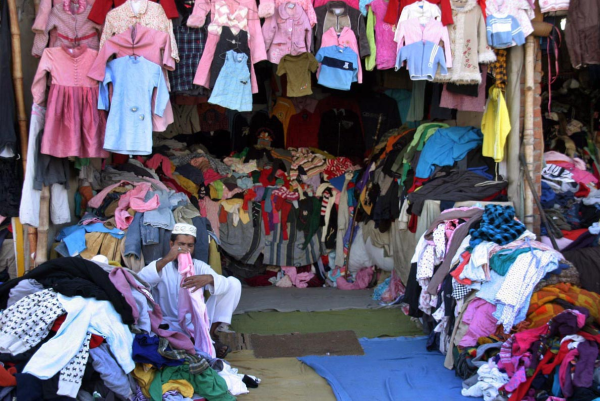Used clothing boom aggravates Pakistan’s environmental crisis
Pakistan lacks the infrastructure needed to dispose of its ever-increasing waste, which includes an estimated 270,000 tonnes of textile waste produced each year. Poverty and inflation are pushing millions of Pakistanis to rely on second-hand clothing. In 2021, the EU exported about 1.4 million tonnes of used textiles or unwanted clothing worldwide.
Islamabad (AsiaNews) – The growing trade in second-hand clothing in Pakistan is raising concerns about its potential environmental impact, this in a country that lacks the infrastructure needed to manage and dispose of its ever-growing waste, including some 270,000 tonnes of textile waste produced each year.
At the same time, rising poverty levels and inflation are pushing millions of Pakistanis to rely on second-hand clothes, turning the second-hand market into a multi-billion dollar industry, but one with ever-increasing environmental costs.
Every day, huge quantities of used clothing from the European Union (EU), the United Kingdom, the United States, and other Western countries arrive at Karachi's export processing zones.
The material is destined for factories like Silver Denim, where workers sort piles of garments by quality before they are processed for re-export to African markets or distribution across Pakistan.
At the same time, once frowned upon, wearing second-hand clothes is becoming commonplace in the South Asian nation.
“The mindset has changed. It's changing. Gen Z has become very aware of saving a lot of things on earth; saving the environment,” said Silver Denim’s director Umair Yousaf.
However, in a country where nearly 45 per cent of the population lives below the poverty line, affordability and cost are the main drivers behind this trend.
According to the Pakistan Business Council, between July 2024 and June this year, the country imported nearly US$ 511 million worth of used clothing, an 18 per cent increase over the previous fiscal period.
Although most of it is re-exported, traders estimate that 10 to 20 per cent ends up in local markets in various cities, sold for two to four dollars apiece, much cheaper than new, locally made garments, which can cost between US$ 18 and US$ 25.
Importing and using second-hand textiles in Pakistan are deeply linked to global patterns.
A 2023 report by the All Pakistan Textile Mills Association and other authors found that in 2021, the EU exported approximately 1.4 million tonnes of used textiles or unwanted clothing worldwide, with Pakistan among its main destinations.
That same year, EU countries shipped US$ 46 million worth of second-hand clothing to the South Asian country.
However, not all exported items make it to store shelves. Because many are in poor conditions, they end up discarded, thrown away, or even burnt, exacerbating the growing waste problem and contributing to global climate change.
Pakistan lacks the necessary infrastructure to manage and dispose of its growing waste, including approximately 270,000 metric tonnes of discarded textiles each year.
Karachi, the country’s largest city with over 20 million residents, has only three controlled landfills and no dedicated textile waste treatment facilities. For this reason, environmentalists are urging the government to tighten regulations on the import of used clothing.
“The Third World should not be used as a dumping ground by the first world,” said Sohail Yousaf, professor of environmental sciences at Quaid-i-Azam University.
“Legislation is needed. We should ban this because only a few people are getting benefits from this business but actually (for) a lot of members of the public, their health is damaged. Their environment is damaged,” he added.
To address the problem, the government has urged companies to adopt sustainable fashion practices such as recycling, creative reuse, and promoting locally produced, eco-friendly clothing.
In fact, climate scientists warn that without global reforms and stronger safeguards, Pakistan will continue to bear the environmental toll of clothing discarded by the rest of the world.
10/02/2022 14:33
23/10/2025 15:40
19/06/2020 14:55
17/03/2021 14:27







.png)










